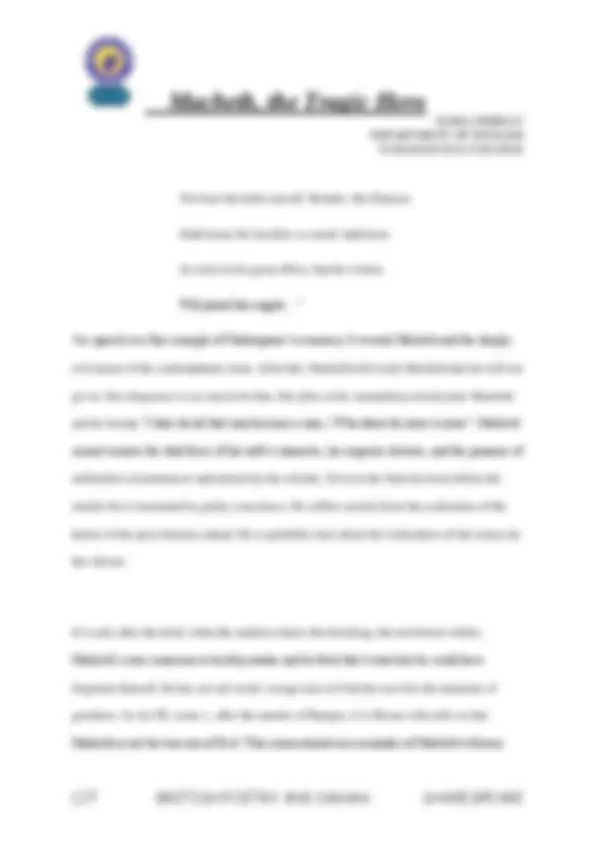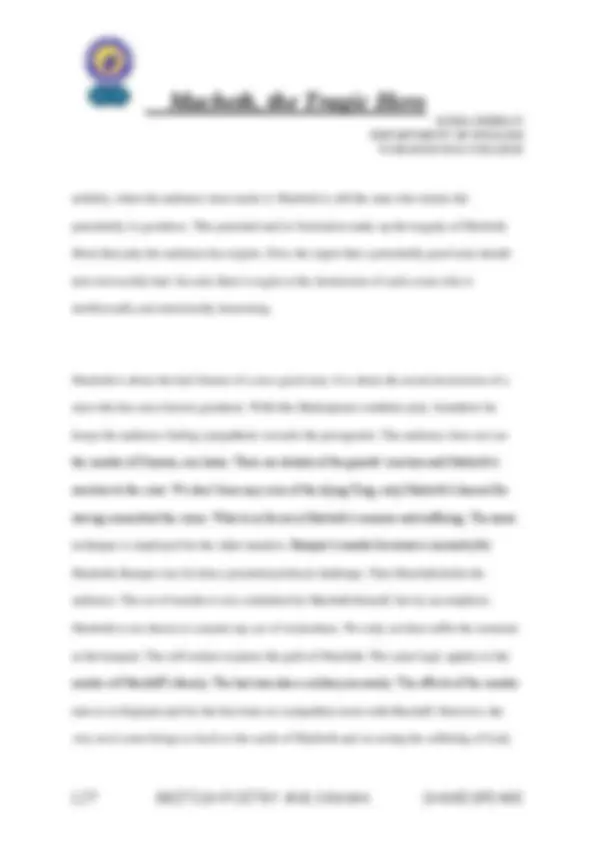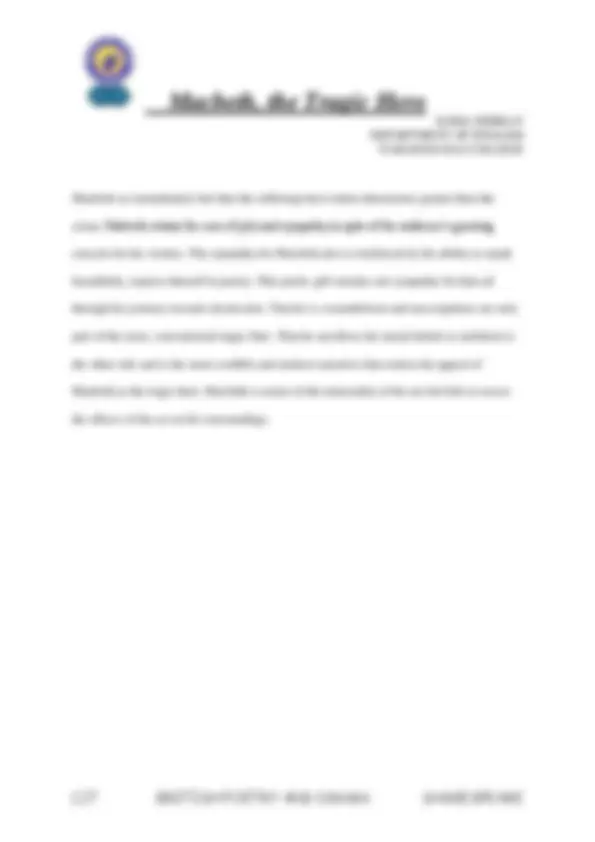





Study with the several resources on Docsity

Earn points by helping other students or get them with a premium plan


Prepare for your exams
Study with the several resources on Docsity

Earn points to download
Earn points by helping other students or get them with a premium plan
Community
Ask the community for help and clear up your study doubts
Discover the best universities in your country according to Docsity users
Free resources
Download our free guides on studying techniques, anxiety management strategies, and thesis advice from Docsity tutors
An analysis of Macbeth, a nobleman from Shakespeare's play, who falls from grace due to his ambition and moral decay. Macbeth's initial greatness, his temptation, and the consequences of his actions, highlighting his vacillation before committing the crime and his awareness of the immorality of his acts. The document also discusses the audience's sympathy towards Macbeth despite his wickedness.
Typology: Exercises
1 / 5

This page cannot be seen from the preview
Don't miss anything!




Macbeth is the story of a noble man, admired by all, respected for his qualities, but finally destroyed, not only physically and emotionally but morally and intellectually. However, when he finally meets his death, the audience does not detest him, but rather pity’s him; there is relief in his death, much more than destruction. Signs of the destruction of Macbeth are never grotesque. His manner of speech attains a certain sharpness that verges on rudeness. He loses his charm. Macbeth’s fall is of dubious nature. The audience need to convince themselves that Macbeth was once truly a great man, a man of great potentialities who could be and was greatly admired. That is achieved by introducing Macbeth as a great warrior, “valour’s minion”, ready to risk his life for his King, his country. The play begins with the great temptation and the consequences leading to the fall of the protagonist. We learn about his prior greatness from testimonies by other characters. Macbeth’s nobility, his greatness was a reality prior to the beginning of the play. The play opens at a point when Macbeth has already coveted the crown, succumbed to temptation; his dark desire is evident by his nervous reaction to the witches’ prophecies.
That wickedness is already present in his mind is a possibility. However at the beginning of the play he is described as “valiant”, a “worthy gentleman”, “noble Macbeth”. The irony of the epithets are realized in retrospect; in the beginning they are apparently true. Most important is the testimony of Lady Macbeth, the evil woman who forces Macbeth down the path of his doom:
“Yet I do fear thy nature, It is too full o’ the milk of human kindness To catch the nearest way. Thou wouldst be great, Art not without ambition, but without The illness should attend it. What wouldst thou highly, That wouldst thou holily; wouldst not play false, And yet wouldst wrongly win.”
The best possible assessment of Macbeth, validated by signs in the thoughts and actions/ reactions of Macbeth. The best proof of his goodness is his vacillation before killing Duncan. Macbeth is tormented by thoughts of committing the crime. He even harps on Chance to crown him. In fact, when he first meets Lady Macbeth he is not resolved to murder Duncan. Lady Macbeth has to use all her rhetoric to put him on the path of murder. Unlike a completely evil man, Macbeth is completely aware of the consequences of his act of violation of the moral order:
“He’s here in double trust: First, as I am his kinsman, and his subject, Strong both against the deed. Then, as his host, Who should against his murderer shut the door,
nobility, when the audience most needs it. Macbeth is still the man who retains the potentiality to goodness. This potential and its frustration make up the tragedy of Macbeth. More than pity the audience has regrets. First, the regret that a potentially good man should turn irrevocably bad. Second, there is regret at the destruction of such a man who is intellectually and emotionally interesting.
Macbeth is about the bad fortune of a once good man. It is about the moral destruction of a man who has once known goodness. With this Shakespeare combines pity. Somehow he keeps the audience feeling sympathetic towards the protagonist. The audience does not see the murder of Duncan, nor hears. There are details of the guards’ reaction and Macbeth’s reaction to the cries. We don’t hear any cries of the dying King, only Macbeth’s lament for having committed the crime. What is in focus is Macbeth’s remorse and suffering. The same technique is employed for the other murders. Banquo’s murder becomes a necessity for Macbeth; Banquo was for him a potential political challenge. Thus Macbeth holds the audience. The act of murder is not committed by Macbeth himself, but by accomplices; Macbeth is not shown to commit any act of wickedness. We only see him suffer the torments at the banquet. The self-torture expiates the guilt of Macbeth. The same logic applies to the murder of Macduff’s family. The last was also a military necessity. The effects of the murder take us to England and for the first time we sympathise more with Macduff. However, the very next scene brings us back to the castle of Macbeth and on seeing the suffering of Lady
Macbeth we immediately feel that the sufferings have taken dimensions greater than the crime. Macbeth retains the core of pity and sympathy in spite of the audience’s growing concern for his victims. The sympathy for Macbeth also is reinforced by his ability to speak beautifully, express himself in poetry. This poetic gift sustains our sympathy for him all through his journey towards destruction. That he is overambitious and unscrupulous are only part of the story; conventional tragic flaw. That he sacrifices his moral beliefs to ambition is the other side and is the more credible and modern narrative that retains the appeal of Macbeth as the tragic hero. Macbeth is aware of the immorality of his act but fails to assess the effects of the act on his surroundings.